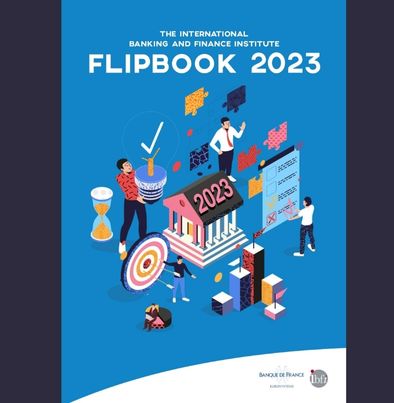   |
ASBA
ASBA HIGHLIGHTS
Institutional Agenda
- On February 7 and 8, 2024, the CIX session of the ASBA Board of Directors was held in Mexico City.
Training
- The Continental Training Program (PCC) is a training program organized and administered by the Association of Banking Supervisors of the Americas. The PCC offers formal, short-term training on topics related to banking supervision to its members. The 2023 Training Program can be found here.
- The Program includes a variety of courses and workshops that address topics such as the supervision of operational risk, climate risks, technological risk, and cybersecurity, among others.
Technical groups and webinars
- To promote the exchange of experiences and knowledge, ASBA has established Technical Groups with representatives from Member organizations. These groups analyze current issues related to the challenges of supervision and regulation in the region. They also develop studies and projects that address the concerns and needs of members. The Technical Committee currently has two Working Groups: Technology for Banking and Climate Change Risks for Banking.
Recommended readings
GENERAL CONSIDERATIONS FOR A CROSS-BORDER MEMORANDUM OF UNDERSTANDING BETWEEN SUPERVISORY AUTHORITIES
The increase in the number and scale of financial groups operating in various jurisdictions in the Americas region, the recent changes in financial institutions’ resolution frameworks, and the emergence of new risks, including cyber risks, suggest the convenience of reviewing of the content of the existing cooperative arrangements with a view to updating them.
In this context, the ASBA Technical Committee considered it to be appropriate to develop a series of principles and recommendations that could serve as a reference for ASBA members when updating their “memoranda of understanding” (MoU) or signing new ones with other jurisdictions with which they have not yet done so.
The document covers the following topics: information sharing, confidentiality, and data protection; licensing and authorizations; ongoing supervision; on-site inspections; and cooperation during crisis situations. Additionally, depending on the scope and mandates, the participating authorities may evaluate including the supplemental principles and recommendations that address specific elements regarding cybersecurity, anti-money laundering and countering the financing of terrorism, and resolution planning and resolvability assessment.
Download report
LESSONS LEARNED FROM THE REGULATORY MEASURES IMPLEMENTED TO FACE THE COVID-19 EMERGENCY
The COVID-19 pandemic has led the Americas region into one of the largest economic contractions on history. Nevertheless, amid the uncertainty and financial turbulence of the last two years, the Banking Regulatory and Supervisory Authority (BRSA) have been a source of resilience. Due to the important reforms following the 2007-2009 crisis, the region's banks are better capitalized and more liquid, so they did not suffer from immediate stress. On the contrary, accompanied by regulatory and supervisory banking measures, the sector has been a participant in supporting the financing needs of the real sector and lessening the economic impacts related to COVID-19.
The pandemic has made it clear that BRSA face formidable challenges, in debt management, budget policies, central banking and structural reforms, as they try to ensure that this global recovery gains traction and lays the foundation for strong growth and development in the long term, while protecting the most vulnerable people and sectors.
In this context, the Association of Supervisors of Banks of the Americas (ASBA) developed the research document: "L Lessons Learned from the Regulatory Measures Implemented to Face the COVID-19 Emergency." The document aims to provide an overview of the potential implications and lessons of the regulatory facilities implemented in the financial sector by countries in the region to deal with COVID-19.
Download report
BIG TECHS IN FINANCE – IMPLICATIONS FOR PUBLIC POLICY
You can now re-watch all the sessions from the BIG TECHS IN FINANCE CONFERENCE organized by the BIS and held on February 8 and 9, 2023.
This conference was a forum for policymakers, regulators, supervisors, and academics to reflect on and discuss various aspects of the regulation and supervision of big tech firms in finance.
The sessions videos are available on the BIS website:
https://www.bis.org/events/confresearchnetwork2302/
overview.htm
Recommended readings
Global Financial Stability Report, April 2024
Chapter 3: “Cyber Risk: A Growing Concern for Macrofinancial Stability”
International Monetary Fund (IMF)
Against a backdrop of growing digitalization, evolving technologies, and rising geopolitical tensions, cyber risks are on the rise. Chapter 3 of the IMF’s Global Financial Stability Report shows that while cyber incidents have thus far not been systemic, the risk of extreme losses from such incidents has increased.
The financial sector is highly exposed, and a severe cyber incident could pose macro-financial stability risks through a loss of confidence, disruption of critical services, and spillovers to other institutions through technological and financial linkages. While better cyber legislation and cyber-related governance arrangements at firms can help mitigate these risks, cyber policy frameworks remain generally inadequate, especially in emerging market and developing economies. Thus, the cyber resilience of the financial sector needs to be strengthened by developing adequate national cybersecurity strategies, appropriate regulatory and supervisory frameworks, a capable cybersecurity workforce, and domestic and international information-sharing arrangements.
To allow for more effective monitoring of cyber risks, reporting of cyber incidents should be strengthened. Supervisors should hold board members responsible for managing the cybersecurity of financial firms and promoting a conducive risk culture, cyber hygiene, and cyber training and awareness. To limit potential disruptions, financial firms should develop and test response and recovery procedures. National authorities should develop effective response protocols and crisis management framework.
Read moreFrom financial inclusion to financial health
BIS Bulletin No 85
Bank for International Settlements (BIS)
• To successfully manage their financial obligations and have confidence in their financial future (financial health) people need to access and use financial services (financial inclusion).
• Yet inclusion alone may not be sufficient: financial health can suffer if the quality of use of financial services is poor (eg issues with provision such as scams or a lack of financial literacy and know-how on the part of the consumers).
• Public policy can boost financial health by promoting financial consumer protection, advancing financial literacy and enacting foundational policies like sound regulation and open finance.
Read moreRead more about:
Stay up to date
Reciba una actualizacion semanal de lecturas recomendadas y noticias relacionadas con Supervisión Bancaria.




